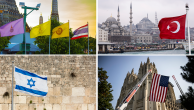Key Findings
A major survey by the Pew Research Center’s Forum on Religion & Public Life finds that most Americans have a non-dogmatic approach to faith. A majority of those who are affiliated with a religion, for instance, do not believe their religion is the only way to salvation. And almost the same number believes that there is more than one true way to interpret the teachings of their religion. This openness to a range of religious viewpoints is in line with the great diversity of religious affiliation, belief and practice that exists in the United States, as documented in a survey of more than 35,000 Americans that comprehensively examines the country’s religious landscape.
This is not to suggest that Americans do not take religion seriously. The U.S. Religious Landscape Survey also shows that more than half of Americans say religion is very important in their lives, attend religious services regularly and pray daily. Furthermore, a plurality of adults who are affiliated with a religion want their religion to preserve its traditional beliefs and practices rather than either adjust to new circumstances or adopt modern beliefs and practices. Moreover, significant minorities across nearly all religious traditions see a conflict between being a devout person and living in a modern society.
A special interactive feature on the pewresearch.org/pewresearch-org/religion website provides dynamic tools that complement the full report providing graphic profiles of the geographic and demographic distributions of religious faiths across America.
The Landscape Survey confirms the close link between Americans’ religious affiliation, beliefs and practices, on the one hand, and their social and political attitudes, on the other. Indeed, the survey demonstrates that the social and political fault lines in American society run through, as well as alongside, religious traditions. The relationship between religion and politics is particularly strong with respect to political ideology and views on social issues such as abortion and homosexuality, with the more religiously committed adherents across several religious traditions expressing more conservative political views. On other issues included in the survey, such as environmental protection, foreign affairs, and the proper size and role of government, differences based on religion tend to be smaller.
Most Americans agree with the statement that many religions – not just their own – can lead to eternal life. Among those who are affiliated with a religious tradition, seven-in-ten say many religions can lead to eternal life. This view is shared by a majority of adherents in nearly all religious traditions, including more than half of members of evangelical Protestant churches (57%). Only among Mormons (57%) and Jehovah’s Witnesses (80%) do majorities say that their own religion is the one true faith leading to eternal life.

Most Americans also have a non-dogmatic approach when it comes to interpreting the tenets of their own religion. For instance, more than two-thirds of adults affiliated with a religious tradition agree that there is more than one true way to interpret the teachings of their faith, a pattern that occurs in nearly all traditions. The exceptions are Mormons and Jehovah’s Witnesses, 54% and 77% of whom, respectively, say there is only one true way to interpret the teachings of their religion.

The lack of dogmatism in American religion may well reflect the great diversity of religious affiliation, beliefs and practices in the U.S. For example, while more than nine-in-ten Americans (92%) believe in the existence of God or a universal spirit, there is considerable variation in the nature and certainty of this belief. Six-in-ten adults believe that God is a person with whom people can have a relationship; but one-in-four – including about half of Jews and Hindus – see God as an impersonal force. And while roughly seven-in-ten Americans say they are absolutely certain of God’s existence, more than one-in-five (22%) are less certain in their belief.

A similar pattern is evident in views of the Bible. Nearly two-thirds of the public (63%) takes the view that their faith’s sacred texts are the word of God. But those who believe Scripture represents the word of God are roughly evenly divided between those who say it should be interpreted literally, word for word (33%), and those who say it should not be taken literally (27%). And more than a quarter of adults – including two-thirds of Buddhists (67%) and about half of Jews (53%) – say their faith’s sacred texts are written by men and are not the word of God.
The diversity in religious beliefs and practices in the U.S. in part reflects the great variety of religious groups that populate the American religious landscape. The survey finds, for example, that some religious groups – including Mormons, Jehovah’s Witnesses and members of historically black and evangelical Protestant churches – tend to be more likely to report high levels of religious engagement on questions such as the importance of religion in their lives, certainty of belief in God and frequency of attendance at religious services.
Other Christian groups – notably members of mainline Protestant churches and Catholics – are less likely to report such attitudes, beliefs and practices. And still other faiths – including Jews, Buddhists, Hindus and Muslims – exhibit their own special mix of religious beliefs and practices.
The Landscape Survey also reveals that people who are not affiliated with a particular religious tradition do not necessarily lack religious beliefs or practices. In fact, a large portion (41%) of the unaffiliated population says religion is at least somewhat important in their lives, seven-in-ten say they believe in God, and more than a quarter (27%) say they attend religious services at least a few times a year.
The findings of the Landscape Survey underscore the importance of affiliation with a particular tradition for understanding not only people’s religious beliefs and practices but also their basic social and political views. For instance, Mormons and members of evangelical churches tend to be more conservative in their political ideology, while Jews, Buddhists, Hindus and atheists tend to be more politically liberal than the population overall. But the survey shows that there are important differences within religious traditions as well, based on a number of factors, including the importance of religion in people’s lives, the nature and certainty of their belief in God, and their frequency of prayer and attendance at worship services.

One of the realities of politics in the U.S. today is that people who regularly attend worship services and hold traditional religious views are much more likely to hold conservative political views while those who are less connected to religious institutions and more secular in their outlook are more likely to hold liberal political views.
The connection between religious intensity and political attitudes appears to be especially strong when it comes to issues such as abortion and homosexuality. About six-in-ten Americans who attend religious services at least once a week say abortion should be illegal in most or all cases, while only about three-in-ten who attend less often share this view. This pattern holds across a variety of religious traditions. For instance, nearly three-in-four (73%) members of evangelical churches who attend church at least once a week say abortion should be illegal in most or all cases, compared with only 45% of members of evangelical churches who attend church less frequently.

These are among the key findings of a major survey on religion and American life conducted by the Pew Forum on Religion & Public Life between May 8 and Aug. 13, 2007, among a representative sample of more than 35,000 Americans. The first report based on the U.S. Religious Landscape Survey was issued in February 2008 and focused on the religious affiliation of the American people, including the impact of immigration and changes in affiliation. This report provides information on the core religious beliefs and practices as well as the basic social and political views of the various religious traditions in the U.S. as well as people who are not affiliated with a particular religion.
The report includes information on members of many religious groups – such as Mormons, Jehovah’s Witnesses, Jews, Buddhists, Muslims, Hindus, atheists and agnostics – that are too small to be analyzed in most public opinion surveys. More detailed tables, provided in an appendix to this report, also summarize the basic beliefs, practices, and social and political attitudes of a dozen Protestant denominational families and 25 of the largest Protestant denominations in the U.S. These detailed tables also include information on what the survey classifies as “other Christians,” which includes such smaller groups as Spiritualists and other Metaphysical Christians, as well as on members of a variety of other faiths, including Unitarians and New Age groups.
To read the Summary of Key Findings in full, download the PDF (18 pages)





